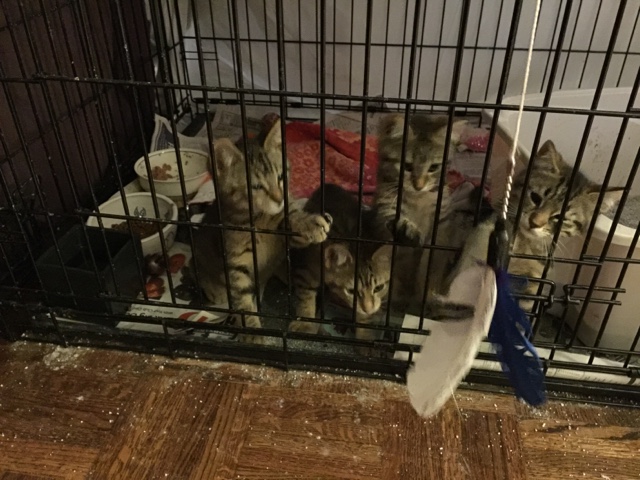Trapping homeless cats will often include trapping kittens and sometimes moms close to delivery. Wee kittens should remain with the mom cat since she can do the best job keeping them alive - literally. So you need to trap and keep everyone together.
Once the kittens are weaned at 4-5 weeks, the kittens can be separated. (Alley Cat Allies recommends 8 weeks, but the longer kittens and mom are together, the more fearful the kittens tend to become of humans so I separate when they're weaned.)
The Purrfect Catch socializes the kittens we trap - and adult cats too when possible. We are not an animal shelter so we manage the amount of cats/kittens we're working with. It's a balancing act because there always seems to be more rescue work needed than we have the capacity to do.
Juniper, shown in this photo, was trapped at a location where she couldn't be returned. She was a bag of bones and you wouldn't know she was pregnant. Except she was frantic in the trap. The trap wasn't securely closed, and she was able to escape from it to give birth in the garage where she was being housed.I secured two traps together with zip ties and used her litter of kittens as 'bait' to trap her. Mother and kittens were then transported to a foster home and placed in a kennel.
After three weeks, I was able to get a low cost spay appointment for her that included vaccinations, flea and worm treatment, and microchipping. She was returned to her kittens after her surgery to continue to nurse and care for them.
Her kittens didn't all wean at the same time so the separation was a gradual process. I'm happy to report the kittens have been adopted. (We partner with a local pet store and hold an adoption fair every Sunday from noon - 3 p.m. at the San Mateo Pet Club to help find homes for socialized cats/kittens.)
Juniper was adopted as a working cat for someone who had a rat/mouse problem in their home, garage, and yard. She's also been working on their gophers. She still needs daily food and water.
If you end-up with bottle baby kittens, be prepared since they're similar to human infants - and even more work. They also are not able to pee/poo on their own so there's a lot of extra care needed for them. It's super important to have a relationship with a local vet to help with their care. I also recommend a FVRCP/Distemper vaccine at 5 weeks. Everyone worries about rabies. I've had more scares with viruses that FVRCP would have helped deter.
Resources:










